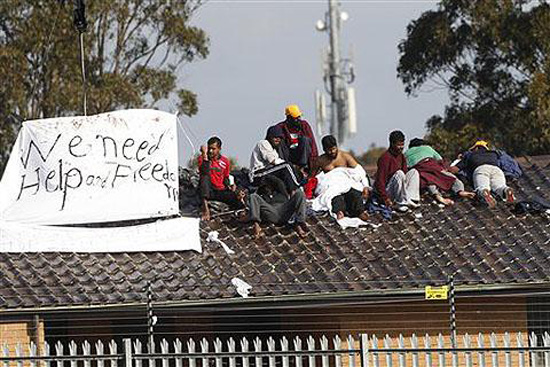
Matilda Bogner
OPINION: Australia is in the grip of a fierce debate over how to treat migrants and asylum seekers who have come to the country fleeing war, famine, human rights abuses and extreme poverty.
Having had its “Malaysia solution” swap deal ruled out by the High Court, the government is seeking legislative change to give effect to this arrangement, where Australia would send up to 800 people who arrived on its shores by boat to Malaysia in return for receiving an additional 4000 refugees. The deal hangs in the political balance, with Labor struggling to secure the numbers to push it through Parliament.
This is, therefore, an opportune time to reflect on the human rights of migrants and asylum seekers in Australia.
The philosophy behind the Malaysia swap is “to break the boat people’s business model”, by discouraging the boats from coming in the first place, however the impact of this policy penalises and jeopardises the human rights of the most vulnerable – the migrants and asylum seekers compelled to move in search of protection. It’s worth pointing out that the right to seek asylum and be treated humanely is enshrined in international law.
Article 14 of the Universal Declaration of Human Rights provides that "everyone has the right to seek and enjoy in other countries asylum from persecution." It is a human right for people to seek asylum; the Universal Declaration of Human Rights protects this.
In her discussions with the Prime Minister and the Minister for Immigration and Citizenship during a recent trip to Australia, the High Commissioner for Human Rights, Navi Pillay, reiterated the long-standing concerns expressed by UN human rights treaty bodies that Australia’s mandatory immigration detention regime is in breach of Australia’s international human rights obligations.
Pillay stated that Australia’s mandatory detention policy has for many years cast a shadow over Australia’s human rights record. Thousands of men, women and – most disturbingly of all – children have been held in Australian detention centres for prolonged periods, even though they have committed no crime.
Harsh reality
It is a harsh reality, this week highlighted by the Australia Medical Association (AMA), that mandatory detention is a practice that can – and has – led to suicides, self-harming and deep trauma. While recognising that there have been some improvements in recent years, OHCHR has also raised concerns regarding the length of detention, conditions of detention, as well as delays in processing security checks and in releasing children and families into the community.
Whatever arrangement Australia ends up with to house and process migrants and asylum seekers it must have adequate safeguards to ensure compliance with international human rights and refugee standards. These include ensuring that there is no real risk of breach of the principles of the 1951 Refugee Convention and the Convention against Torture – which Australia has ratified (but Malaysia has not).
It is our strongly held view that assurances of compliance with these standards are not sufficient, and should be legally entrenched.
The consequence of the damaging political rhetoric that Australia is being “flooded” by people who are “queue jumpers” has resulted in a stigmatisation of an entire group of people, irrespective of where they have come from or what dangers they may have fled.
I wish to reiterate the comments of the High Commissioner when I urge the leaders of all Australia’s political parties to take a principled and courageous stand to break this ingrained political habit of demonising asylum-seekers. The current political impasse in Australia is an opportunity for politicians and policy makers to shift the goal posts, to change terms of the debate and to have a fresh conversation with the nation about who a migrant or an asylum seeker really is, and how your proud nation ought to treat them.
Matilda Bogner is the Regional Representative for the United Nations Office of the High Commissioner for Human Rights (OHCHR) Regional Office for the Pacific, based in Suva, Fiji.
The OHCHR Regional Office for the Pacific covers 16 countries: Australia, Cook Islands, Fiji, Federated States of Micronesia, Kiribati, Marshall Islands, Nauru, New Zealand, Niue, Palau, Papua New Guinea, Samoa, Solomon Islands, Tonga, Tuvalu and Vanuatu.



